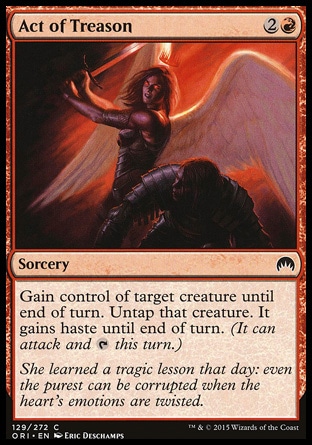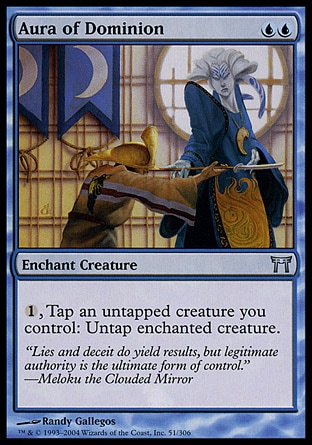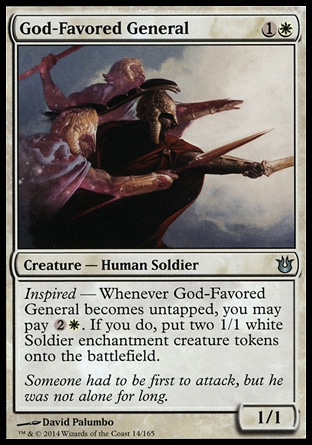As soon as Pain Seer got spoiled for Born of the Gods, players started referring to it as the new Confidant. Indeed, the effects of these two cards' triggered abilities are almost identical. Let us see where the difference lies between the Seer and the Confidant.
Pain Seer and Dark Confidant have much in common. Mana cost, creature types and power are an exact match.
Pain Seer’s toughness is just one greater. Either one dies to a sneeze. The main difference is the triggering event. Confidant’s trigger goes off on each upkeep of yours. It means you are pretty much guaranteed to get this trigger. You do not have to attack with the Confidant or perform other weird manipulations.
In order to force you to skip the trigger, one needs to either make the Confidant lose the ability, or make you skip your upkeep step. Either is really hard to attain. That is why the Confidant is so good.
Inspired
Pain Seer’s trigger is marked with the word “Inspired”. You won’t find any rules on this word, because just as Heroic or Landfall, these are ability keywords. They aren’t associated with any specific rules, they are just used to group abilities that are alike in a way. These abilities do not even have to be of the same type. We are lucky with Inspired though, all abilities marked with this keyword are triggered ones. They go off every time the creature with Inspired becomes untapped.
According to the rule 603.2d., “becomes untapped” means “was tapped before and then becomes untapped”. Only such an event will trigger Inspired. The trigger doesn’t care how the permanent untaps or how it got tapped. Any rules or effects may be reasons therefor. You may not just tap or untap a permanent because you so desire.
Nothing happens “just like that” in Magic! |
How can a creature become tapped?
- Attack. If the creature doesn’t have Vigilance, it must be tapped to be declared attacking. Do you remember about Summoning sickness?
- As part of paying the cost of a spell or activated ability: Springleaf Drum, Sigil Tracer, Smuggler’s Copter
- As a result of applying an effect: Hands of Binding.
How can a creature become untapped?
- During the untap step as a turn-based action.
- As part of paying an activated ability cost: Gilder Bairn (this kind is rather rare).
- As a result of applying an effect: Thousand-Year Elixir, Aurelia, the Warleader, Burst of Strength.
There exists a fair lot of cards whose effect allows “tapping or untapping” a permanent: Hidden Strings, Merrow Reejerey, Pestermite. They allow us to choose the effect we want at the given moment.
If the creature with Inspired is untapped during the untap step, the trigger that goes off in that step will wait for the next step, because no player ever gets priority during the untap step. Only during the upkeep step, after all SBA have been performed, the triggers that have gone off so far are put onto the stack. That happens in APNAP order. Since we are in your turn, you are the active player, thus all your triggers are put onto the stack first, followed by your opponent’s triggers. You may put your triggers onto the stack in any order you like.
How does this work?

If the cunning opponent steals a tapped Pain Seer, it will untap through Act of Treason’s effect, and its trigger will go off. Since the opponent controls the Seer at the time, they will be the one to reveal the card and put it in hand.
If a cunning yet inexperienced opponent steals an untapped Pain Seer, the trigger won’t go off.

If you enchant Pain Seer with Aura of Dominion, and then as the cost of activating its ability, tap the Seer itself (untapped one, of course), by the time the ability resolves it will be tapped, so untapping it will cause the trigger to go off. Provided you have enough mana, you may repeat this process several times.

If you control a Pain Seer and a Mirri’s Guile**, then despite the fact that their triggers go off in different steps, they are put onto the stack at the same time. You may choose to put the Seer’s trigger first, then Mirri’s Guile trigger. If they resolve successfully, you will first set up your topdecks, then reveal the “right” card.
Triggers with keyword “Inspired” have different effects. Noting that we only get the trigger effect as it resolves, let us take a look at God-Favored General:

God-Favored General’s trigger effect allows you to pay {2W} and get two tokens if you do.
- You cannot pay multiples of {2W}. Extort will enlighten you on why that is so.
- The tokens are created as the trigger resolves, and it happens at the upkeep step, as we already determined. This means the tokens will be “summoning-sick” and will not be able to attack — you have not controlled them continuously since the beginning of your most recent turn!
Going back to the Pain Seer, I’ll remind you that its effect does not imply drawing a card. You reveal the card and put it into your hand. This means that Dredge isn’t friends with the Seer, but Spirit of the Labyrinth doesn’t limit him in any way.
If you have questions about mana value, help yourself to the article on Bob.
Learn from other people’s mistakes
Pain Seer’s trigger is not “usually detrimental” — we play the Seer for its trigger. So if you miss the trigger, even at a competitive rules enforcement level event, you will get no punishment. This trigger will be considered missed only when you take an action that will certainly mean that the time for resolving the trigger has passed. Drawing a card at your draw step ("for turn") is such an action (it means you are already past your upkeep step). Activating an ability or casting an instant spell isn’t any such action, since the Seer’s trigger might very well still be on the stack awaiting resolution.
If you miss the Seer’s trigger and realize that fact no later than at the end of the same turn, its further fate will be up to your opponent. At their will, it would either be ignored or put onto the stack.
You cannot “forget” the trigger intentionally. This sort of ruse will be considered Cheating and lead to Disqualification.
If you don’t miss the trigger, but forget to reveal the card, it’s very bad. It is a game play error that the opponent cannot verify — a Hidden Card Error. Previously, the punishment for such an action would be a Game Loss. It has been reduced to a Warning; but as a remedy, the judge will have your opponent look at your hand and pick a card of their choice, and you will lose life equal to its mana value. It will probably be a card of the highest possible cost, but such is the price of this kind of error. The one thing that can save you is when it is uniquely identifiable which card exactly was put into your hand. For example, if that card had been revealed previously, or you had an empty hand and accidently put that one card into your hand.
Finally, your opponents don’t have to remind you about your trigger if they don’t wish to. Spectators may not do so! If an excited spectator exclaims “HEY! What about the Seer trigger!?”, they will receive a whooping Match Loss for Outside Assistance.
In cozy regular rules enforcement level events, if you recall the missed trigger early enough, as a rule the judge will put that trigger onto the stack. Your opponents are still not bound to remind you of your trigger, but they may do so.
Translated by Witas Spasovski

Oracle Text:
Creature — Human Wizard
Inspired — Whenever Pain Seer becomes untapped, reveal the top card of your library and put that card into your hand. You lose life equal to that card's mana value.